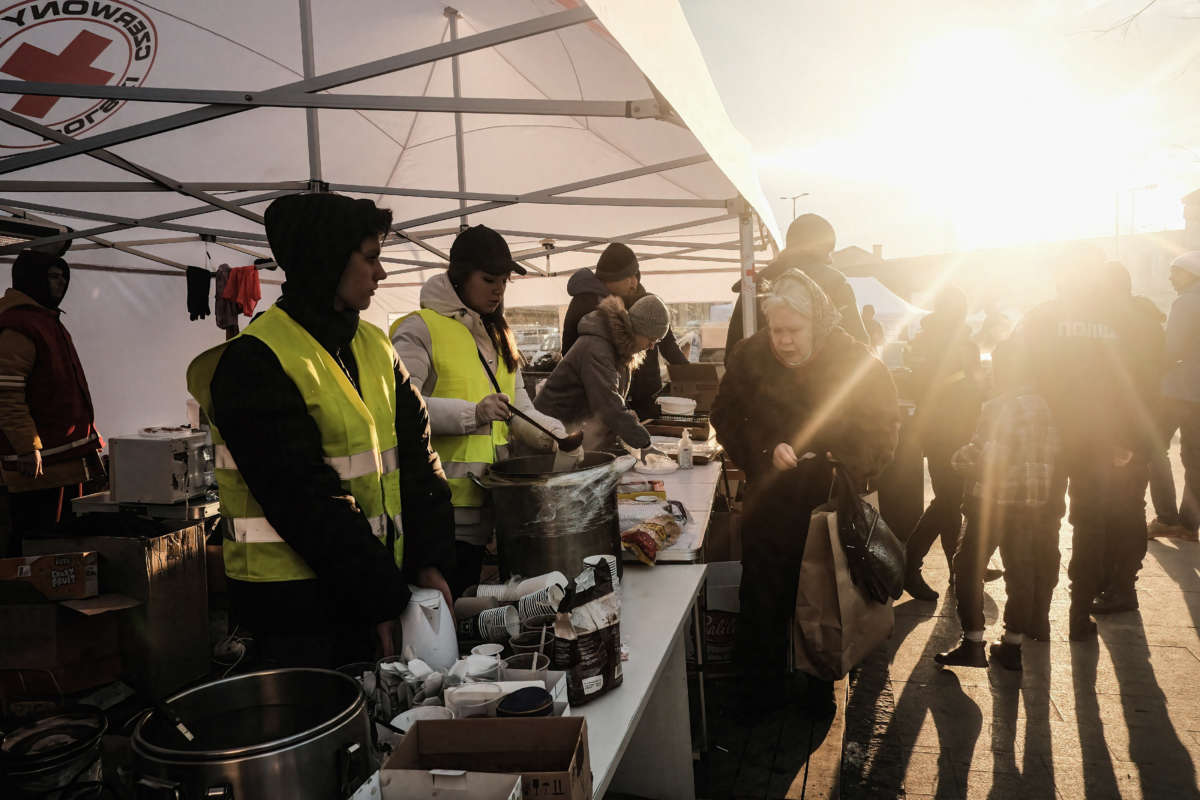Honest, paywall-free news is rare. Please support our boldly independent journalism with a donation of any size.
The head of the United Nations warned Monday that Russia’s assault on Ukraine is pushing the global food system to the brink of disaster as wheat prices skyrocket and key supply chains are thrown into chaos, threatening a hunger crisis in Europe and well beyond.
“Russia and Ukraine represent more than half of the world’s supply of sunflower oil and about 30% of the world’s wheat,” U.N. Secretary-General António Guterres said in remarks to the press in New York City. “Ukraine alone provides more than half of the World Food Programme’s wheat supply… All of this is hitting the poorest the hardest and planting the seeds for political instability and unrest around the globe.”
Oxfam International sounded the alarm Tuesday over the impact that Russia’s war on Ukraine could have on the already hunger-stricken people of Syria, a country that relies heavily on imports from Russia.
Guterres noted in his statement that, weeks into Russia’s invasion, “grain prices have already exceeded those at the start of the Arab Spring and the food riots of 2007-2008” and the U.N. Food and Agriculture Organization’s (FAO) global food prices index is now “at its highest level ever.”
“Forty-five African and least-developed countries import at least one-third of their wheat from Ukraine [or] Russia — 18 of those countries import at least 50%,” Guterres continued. “This includes countries like Burkina Faso, Egypt, the Democratic Republic of the Congo, Lebanon, Libya, Somalia, Sudan, and Yemen. We must do everything possible to avert a hurricane of hunger and a meltdown of the global food system.”
Guterres also warned that Russia’s invasion of its neighbor and President Vladimir Putin’s alarming rhetoric has brought the prospect of a full-blown nuclear war “back within the realm of possibility.”
“Further escalation of the war, whether by accident or design, threatens all of humanity. Raising the alert of Russian nuclear forces is a bone-chilling development,” Guterres said. “It’s time to stop the horror unleashed on the people of Ukraine and get on the path of diplomacy and peace.”
The U.N. chief’s urgent appeal for a halt to the conflict came as Russian and Ukrainian negotiators prepared for another round of talks Tuesday amid Russia’s continued military onslaught. According to the Associated Press, “Russia’s relentless bombardment of Ukraine edged closer to central Kyiv on Tuesday, with a series of strikes hitting a residential neighborhood.”
“Shortly before dawn, large explosions thundered across Kyiv from what Ukrainian authorities said [were] artillery strikes,” AP reported. “The shelling ignited a huge fire and a frantic rescue effort in a 15-story apartment building. At least one person was killed and others remain trapped inside.”
Russia’s intensifying attacks on the Ukrainian capital came as the leaders of Slovenia, Poland, and the Czech Republic announced they would visit Kyiv on Tuesday to meet with Ukrainian President Volodymyr Zelenskyy in a show of support.
In an address Monday night, Zelenskyy — who is demanding an immediate ceasefire and the withdrawal of all Russian troops — sounded a note of cautious optimism following the latest round of diplomatic talks between Russia and Ukraine’s delegations, saying the discussions went “pretty well.”
Press freedom is under attack
As Trump cracks down on political speech, independent media is increasingly necessary.
Truthout produces reporting you won’t see in the mainstream: journalism from the frontlines of global conflict, interviews with grassroots movement leaders, high-quality legal analysis and more.
Our work is possible thanks to reader support. Help Truthout catalyze change and social justice — make a tax-deductible monthly or one-time donation today.
